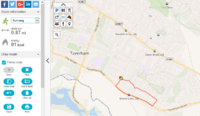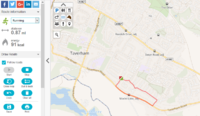0.87 miles.
Second short recovery run. So far so good!

Second short recovery run. So far so good!
Good going Tiny. I miss running. I must have missed it in this thread but , if you don't mind, fill me in about your leg.0.87 miles.
It was dark, cold and wet but my leg feels stronger and the run was good!
View attachment 1186889
Good going Tiny.
I must have missed it in this thread but , if you don't mind, fill me in about your leg.
Your right about a point of diminishing returns on mileage, although that point is different for different people. When I first started running I did so to improve my game at tennis, baseball, basketball etc. and I found it did and that benefit increased with my mileage until I started running more than six miles a day, more than thirty a week. Then my quickness started to slide. I was getting better and faster at running at the expense of quickness and explosiveness at other sports so I backed off. Ten, twelve years later Im playing less other sports and my friend talked me into running my first road race, I was immediately hooked and I truly began running to get better at running.Thanks!
I don't mind at all. I started running again around April of this year after maybe 5 years off. The first run of just over a mile was tough, everything hurt, even my head and I had no wind but things improved quickly apart from a niggle in my right knee. I ignored it, the knee got worse and my limping runs caused me to over compensate, pulling a muscle in my left hip flexor.
I couldn't walk for a few days, limped for 2-3 weeks but recovered without issue. I started out slow next time, short 0.87 mile runs every other day as I'm doing at the moment, gadually increased frequency and distance to 2 miles a day, 6 days a week. I felt so good that I went from there to 5 miles a day, 6 days a week in just six weeks. Everything was great until it wasn't. On the first cold day of the year, a Friday near the beginning of October, I ran particularly hard and fast, maybe 5-6 minutes a mile pace and felt something in my upper left thigh. The following day it hurt when I went for a walk. I ran another 5 miles the day after that, more pain and the next day it hurt to put weight on my left leg again, the same area as before, left hip flexor. I gave it a few days, tried a short 2 mile run for a day or two, the pain got worse so I stopped again and so it went, the runs getting shorter and shorter but the pain never improving. In the end I finally accepted reality and rested properly.
Three and half weeks later and we're up to my first post in this thread, four days ago. During this injury lay-off I've done some reading about running (I didn't know people had written so much on the subject) and found that the best way to measure mileage is weekly, not daily as I'd been doing. Also, there's this theory of the 10 percent rule, in which you increase your weekly mileage by no more than 10 percent of your current mileage (with some exceptions). I also read that 15 to 20 miles a week is the most beneficial. More than that can begin to have a negative effect. The legendary boxing trainer, Angelo Dundee said 3 miles a day, no more, no less.
So that's what I'm planning to work back up to, around 19-20 miles a week, but gradually. It's said that slow and steady wins the race and I'm hoping it will be without injury this time around!
Your right about a point of diminishing returns on mileage, although that point is different for different people. When I first started running I did so to improve my game at tennis, baseball, basketball etc. and I found it did and that benefit increased with my mileage until I started running more than six miles a day, more than thirty a week. Then my quickness started to slide. I was getting better and faster at running at the expense of quickness and explosiveness at other sports so I backed off. Ten, twelve years later Im playing less other sports and my friend talked me into running my first road race, I was immediately hooked and I truly began running to get better at running.
No, I've had lifelong back issues that began when I was 8 with a spinal tumor and other back related surgeries as a teenager all of which went south on me ending my active life around 8 or 9 years ago. Ended up disabled officially although I spent years and a good portion of my retirement funds fighting to fix it and stay working.All these rules of thumb vary from individual to individual. A lot of it is theory and opinion. Angelo Dundee says 3 miles, no more no less. Manny Pacquiao used to run 6 miles a day, probably he still does and it didn't hurt his stamina much! I've not seen many boxers throw as many punches as he did over 12 rounds at his peak. I'm sure there are people who do marathons again and again and never have a problem. It depends on the why, I think. My intention is to run for the rest of my life, so as to keep my cardiovascular system in top shape for as long as possible. For that I need a healthy, strong body that isn't over stressed or over trained. Others will have different motives.
You say you miss running. I can see why. Anything replaced it?
But back to running. There's running to get fit and improve your all around athleticism, then there's running to be the best runner you can be. They're kind of mutually exclusive.
Glad to see you're improving and enjoying it. Remember the old saying though, speed kills. As a rule of caution, don't increase distance and speed together. Up your mileage until you've got a new consistent distance for a few weeks or so then drop back to your old distance every third or so run but at a faster pace. But I'm not a coach or anything, just a little knowledge picked up.
Glad to see you're improving and enjoying it. Remember the old saying though, speed kills. As a rule of caution, don't increase distance and speed together. Up your mileage until you've got a new consistent distance for a few weeks or so then drop back to your old distance every third or so run but at a faster pace. But I'm not a coach or anything, just a little knowledge picked up.


Very common, struggling to run at a slower pace. Sometimes more exhausting, mentally. The best advice i ever got about pace is if you can't talk, have a conversation, without gasping for breath, you're going to fast. I would talk to myself at various points of my solo runs. People passing by probably thought I was crazy. As your conditioning improves the pace you can do that at will increase too.Thanks for the advice! I have to remind myself of this often, I struggle to run slowly.
0.87 miles
Awful weather but the run was awesome!
View attachment 1190006
Very common, struggling to run at a slower pace. Sometimes more exhausting, mentally. The best advice i ever got about pace is if you can't talk, have a conversation, without gasping for breath, you're going to fast. I would talk to myself at various points of my solo runs. People passing by probably thought I was crazy. As your conditioning improves the pace you can do that at will increase too.
P.S. the conversational pace advice doesn't apply to speedwork, obviously.
As long as we're on breathing, if you can work a rhythm, your exhales should be quicker maybe explosive is a good word, and shorter than your inhales. I would inhale for two strides then a deep, short exhale on the third. This way my exhale would be on a right stride then left, right left etc. It didn't take long for the rythm to be almost instinctive. One or two runs. I was told it helped get more oxygen in. I worked that pattern out for me but my running buddy had a different one.I read this very thing a few weeks ago. I was and still am a little skeptical. An increase in heart rate and breaths taken should go up as you run to deliver the oxygen to the muscles that need it. The harder you work, the bigger the increase. But I generally agree. Don't over do it and breathe easy.
The article I read said that you should be able to recite The Star Spangled Banner. I sometimes use the expletive filled drill sergeant songs from Full Metal Jacket as my mental runnning rhythm. Maybe I'll try singing them out loud next time, lol.